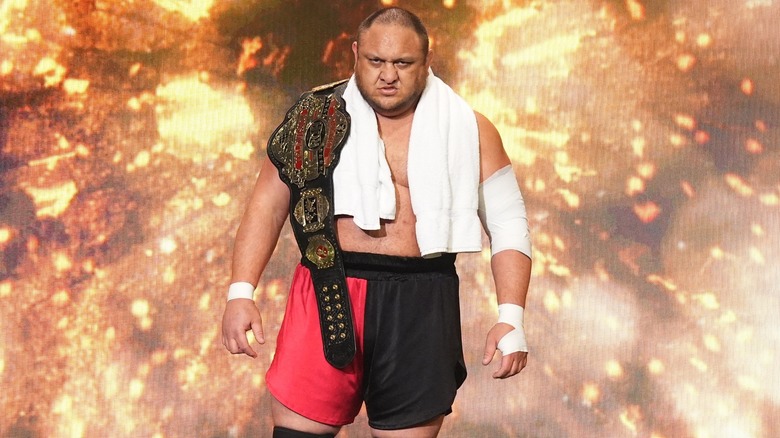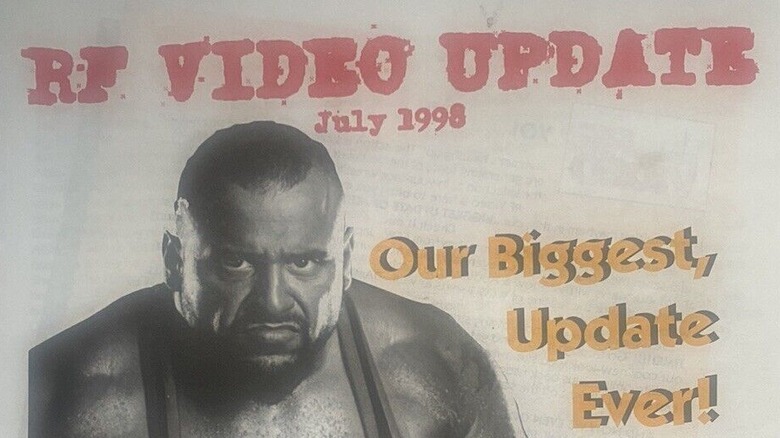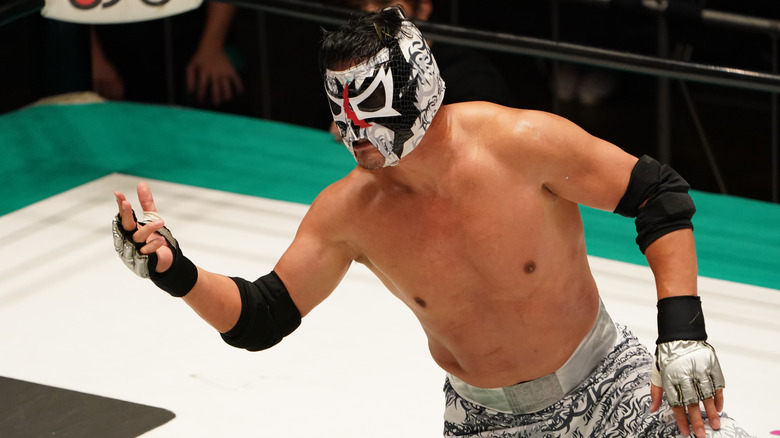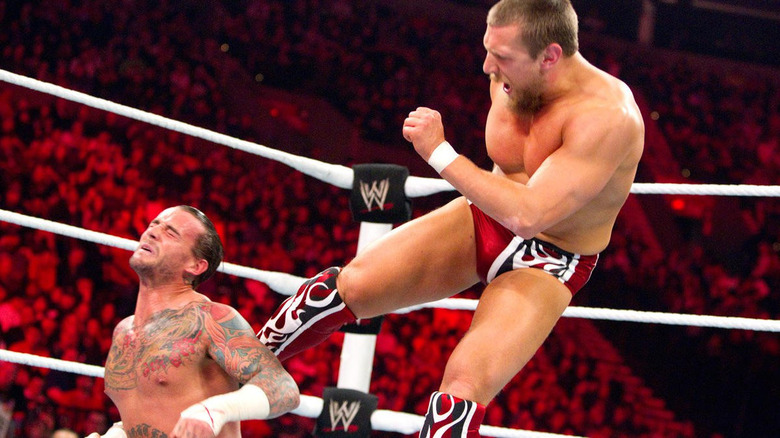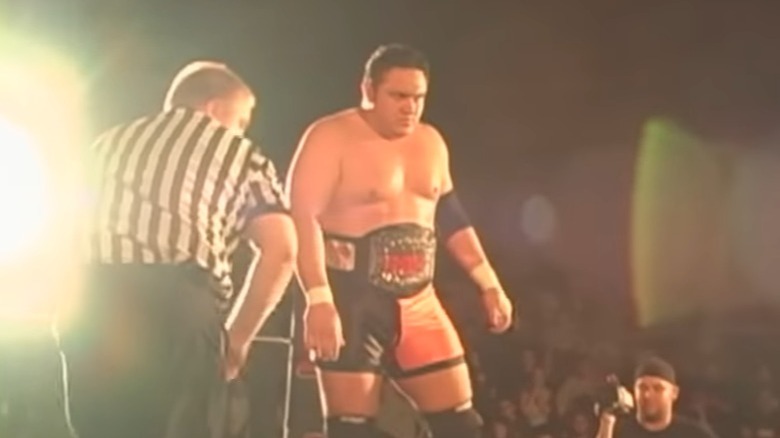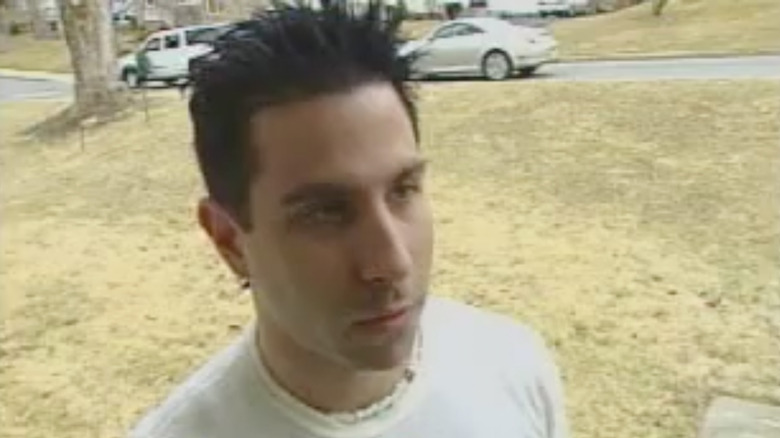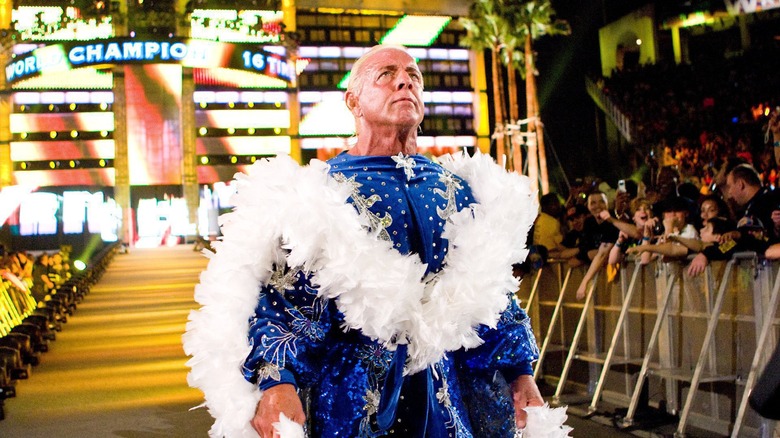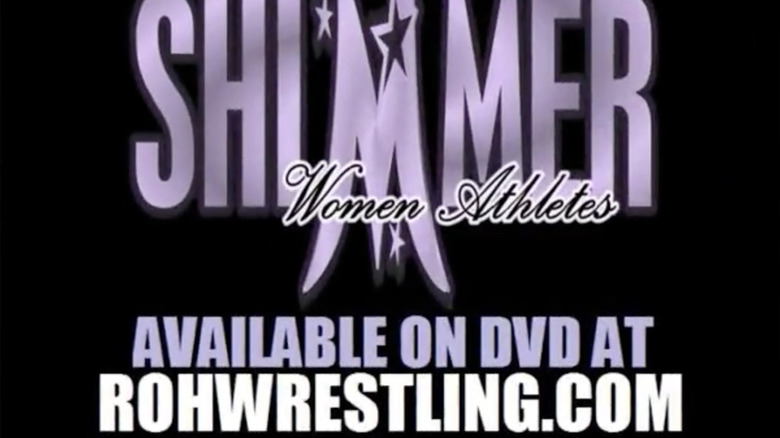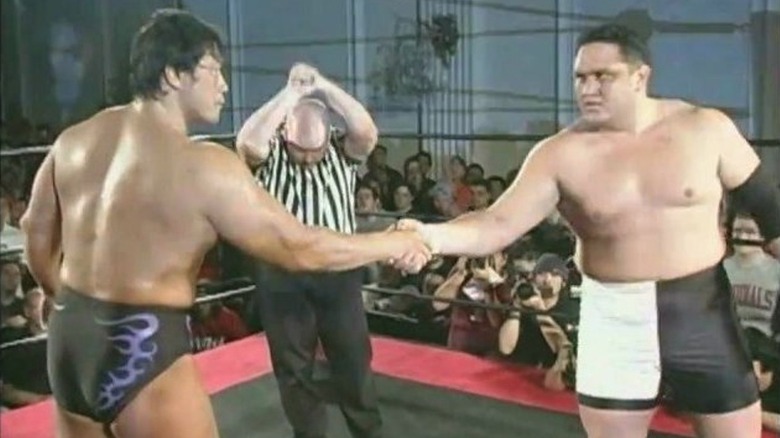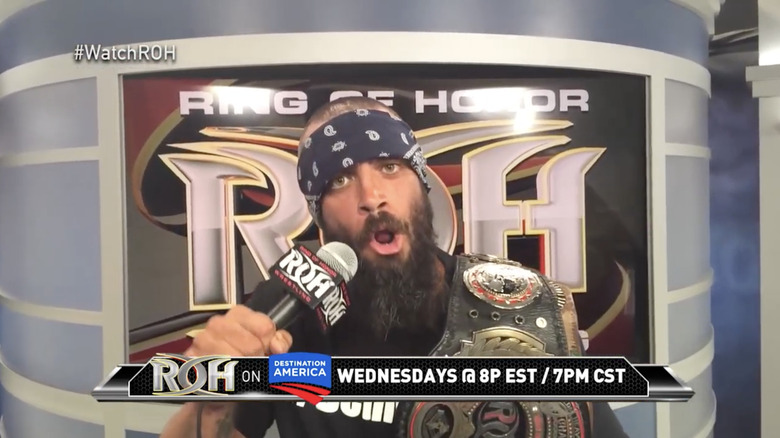Facts About Ring Of Honor Only Hardcore Fans Know
Before being purchased by Tony Khan in 2022, Ring of Honor had about as strange a path as any promotion could over the course of its 20 years in business. It started as the first modern "super-indie," an all-star troupe of the best unsigned wrestlers in the United States brought together to sell videotapes as the primary revenue driver over live event tickets. Over the course of the next decade, ownership changed hands from a tape dealer to a ticket broker to a publicly traded corporation that owns numerous local broadcast television stations, the company expanding along the way. But that all fell apart in late 2021, when the company went on "hiatus" en route to the sale to Khan, stemming from losses that piled up during the height of the COVID-19 pandemic.
With that in mind, there's a lot that can be learned about the history of Ring of Honor, much of which is not particularly well-known to those who didn't live through it. Some of these things, including the ownership changes in the early years and the reasons for them, may even come as a bit of a shock. If you didn't have a great feel for what ROH was when you found out that Tony Khan had bought it from Sinclair Broadcast group, then this should help you get acquainted with its past.
They launched to replace lost home video revenue from ECW
There are some things that can feel difficult to explain if you didn't live through the rise and fall of Extreme Championship Wrestling from 1994 to 2001. One is that the biggest beneficiary of the desirability of ECW videotapes may not have been ECW. Local tape trader Rob Feinstein made a deal to sell all ECW videos and benefited greatly, soon rebranding as the more official-sounding RF Video. When ECW folded in 2001, this created a problem: What was RF Video without ECW, and what could fill that void?
As noted in a 2022 DailyDDT article, the answer was starting an RF Video-backed promotion, specifically Ring of Honor. "[T]here is life after ECW for us," Feinstein wrote on RFVideo.com in April 2001, just weeks after ECW's parent company filed bankruptcy. "I am very happy right now and have some great ideas for the future. We already even had talks of starting up our own little promotion in Philly." It took several months for ROH to be announced, though, with the official press release being posted on RFVideo.com and sent out to wrestling news websites on December 3.
Their original relationship with NJPW ended badly
Starting in 2014, Ring of Honor served as the American partner promotion for New Japan Pro-Wrestling, climaxing in a combined show, G1 Supercard, at Madison Square Garden in April 2019. This was not the first time that the two companies had a working agreement, though. After previous flirtations with Zero-One and All Japan Pro Wrestling, ROH started working with NJPW in late 2004 to bring in Jushin Thunder Liger, and the relationship grew from there. In April 2005, ROH got to host a one-night tournament to serve as a qualifier for NJPW's annual Best of the Super Junior round robin tournament, and though that seems like it should have strengthened the relationship, it's actually where everything went to hell.
The opening round was easy to call since each match had one wrestler with NJPW ties in it: Bryan Danielson, Black Tiger (Rocky Romero), James Gibson (Jamie Noble), and Dragon Soldier B (Kendo Kashin). In theory, as an American qualifier, it made the most sense for Danielson or Gibson to win the tournament, and as then-ROH booker Gabe Sapolsky told Inside Pulse in 2009, that was the original plan. NJPW, for whatever reason, eventually flipped the script and ordered ROH to have Dragon Soldier B come out on top. That Kashin in this gimmick — the nature of which has never been explained, for whatever it's worth — was working a style much heavier on shtick than that of the bulk of ROH and NJPW wrestlers at the time didn't help how this was received. Neither did Dragon Soldier B not being in Best of the Super Juniors, rendering the ROH tournament pointless. (He did work the G1 Climax heavyweight tournament a few months later as Kendo Kashin, though.)
CM Punk and Bryan Danielson had stints running the ROH wrestling school
For almost its entire existence, Ring of Honor had its own wrestling school, with the most prominent graduate probably being eventual ROH TV and Tag Team Champion Rhett Titus. Until his rise to prominence, though, the student were not really in the mix of the main storylines in ROH. If you were pretty familiar with ROH when they were actively running shows, particularly in the years before Sinclair Broadcasting bought the company, then there's a pretty simple explanation for that: In a promotion built around showcasing the best wrestlers on the independents, where do student wrestlers fit in?
Still, the school existed with little interruption for well over a decade, starting with CM Punk's reign as head trainer, which was reported on in the October 20, 2003 issue of the Wrestling Observer Newsletter. Punk would oversee the early classes for the duration of his time in the promotion, turning in the keys when he signed with WWE in 2005. The following year, the school was taken over by another future worldwide superstar, Bryan Danielson, who served as head trainer for several months. "Their attendance was not very good," Danielson told the Philadelphia Inquirer in 2016. "I always feel like I wasn't the best trainer, because I'm really good at teaching people stuff but I'm not good if people aren't super psyched — if they're not like me. If they just come in and say 'Yeah! I want to be a wrestler.' Well OK, what do you want to learn today?"
For many years, the ROH Champion wasn't allowed to lose matches in other indies
Within a few years, thanks largely to Samoa Joe's title reign, the ROH World Championship had an aura unlike any other title on the independent scene. Joe as champion was so obviously The Man and as such his long, dominant reign greatly increased the perceived value of the ROH belt. However, as an independent promotion that couldn't afford to sign wrestlers to contracts, this meant that, unchecked, the most prestigious title on the indies could be greatly diminished if the champion lost on another promotion's show. The solution? Making it known that the reigning ROH Champion simply won't lose anywhere else.
"Since the company was first formed in 2002, they went well out of their way to protect the credibility of the championship and always asked whoever held that belt to not do jobs on the independent scene," Mike Johnson reported at PWInsider in 2014. At the time, which was three years into Sinclair Broadcasting owning ROH, this came up because Michael Elgin had just done a clean job for Trevor Lee (now Cameron Grimes in WWE) in Pro Wrestling Guerrilla's Battle of Los Angeles tournament while champion. That said, it would be reasonable to think the "no outside jobs" rule had become more relaxed because of how WrestleMania weekend 2013 played out: Kevin Steen (now Kevin Owens in WWE) losing clean to Dan Maff on the undercard of a Pro Wrestling Syndicate show the night before he lost the ROH World Title to Jay Briscoe.
ROH's original owner got caught in a To Catch a Predator style TV news bust
Rob Feinstein ended up being forced out of ROH in the weeks after he had been caught on camera by Philadelphia's WCAU-TV in 2004 as part of an attempt to expose men who sought out sexual encounters with children online. Feinstein, for his part, has always claimed, including in a 2014 Facebook post preserved by WrestlingNews.co, that a chat log published by online vigilante group Perverted Justice was doctored as part of a conspiracy to drive him out of the company he founded. Still, in the immediate aftermath of the story airing, it was clear what had to happen: Feinstein had to go.
That was easier said than done. As was reported by Dave Meltzer in the June 21 and June 28, 2004 editions of his Wrestling Observer Newsletter, though Feinstein had legitimately signed over his shares of RF Video and ROH to roommate/longtime employee Doug Gentry, it was effectively to hold them for Rob. To a point, this was moot, though, as that piece of ROH was not the majority of the company. Feinstein had given 55% to ticket broker Cary Silkin, who had previously been a silent investor, as part of a deal to be able to make payroll at a time when ROH was insolvent. This meant that once the battle lines were drawn, it was a lot easier to push the founder out, especially when it became clear that initially, ROH was lying about Feinstein being completely gone. This started to cost ROH venues, so with the reality of the situation being clear to even Feinstein, Silkin was able to make a deal to purchase the remaining 45%.
They sued Ric Flair for no-showing prepaid appearances
In 2008, stemming from his "retirement" at WrestleMania XXIV, Ric Flair was on fire and getting tons of lucrative offers ... which he had to turn down due to his WWE contract. As reported by Dave Meltzer in the August 11, 2008 issue of his Wrestling Observer Newsletter, Flair was making his $500,000 downside guarantee in WWE, but his offers on the outside included a guaranteed $225,000 package of 30 appearances. That was the big one, but there were a lot more on the table. Naturally, Flair solved this dilemma by securing his release from WWE. As Meltzer would report the following week, Flair's starting rate for an appearance was $15,000; he had no shortage of bookings at that figure.
In 2009, both in general and with their national TV debut on HDNet (now AXS TV) coming soon, Ring of Honor was looking for a boost. What better way to get one than to integrate Flair into the mix? As Meltzer reported in the February 23, 2009 Observer, the deal was made for five shows at $15,000 each, "plus two first class plane tickets, first class hotel and limo transportation" for each trip. A month later, in the March 23 Observer, Meltzer reported that Flair's debut was a huge success, but the tide turned quickly. Three months after that, per the June 22 Observer, after Flair went back to WWE, he said he couldn't work TV anymore. Though Meltzer reported that Flair returned his outstanding advance payments of $41,000, this was not the case. The following January, ROH sued Flair for the full amount (actually $41,420), eventually securing a default judgment when he never responded to the lawsuit.
Shimmer Women Athletes started as an ROH offshoot
Women's wrestling on the independent scene was a lot different in the early 2000s. Active women in a given area were rare and intergender wrestling had not yet been normalized, so it was common to see the same opponents wrestle each other over and over. In New England, Mercedes Martinez was constantly working with Trinity H. Campbell. In Missouri, Heather Savage was eternally battling Miss Natural. In Minnesota and other parts of the midwest, Lacey's opponent was always Rain. You get the idea: No matter how talented a given female wrestler was and/or how much upside she clearly had, the developmental curve for her in-ring skills would be quite steep given the lack of depth of dance partners. There needed to be an ROH for women so they could develop at a faster rate.
Enter Shimmer Women Athletes, an all-women's promotion founded in 2005 by Dave Prazak and Allison Danger. Immediately, everyone got experience working with other women from outside of their local areas. And with Prazak then being ROH's lead announcer, Shimmer found itself with the advantage of being an ROH affiliate promotion, with Cary Silkin's promotion handling Shimmer's DVD distribution and, starting with WrestleMania weekend 2006, Shimmer showcase matches on ROH shows. Though Shimmer would eventually end the relationship with ROH, the influential women's promotion definitely owes some of its early success to its proximity to the more established company. That goes doubly so since, as reported in the November 14, 2005 edition of Figure Four Weekly, "like ROH, the idea is to make money off the DVD releases," so ROH marketing the DVDs to fans already inclined to buy similarly presented men's shows was key to building the fan base.
Kenta Kobashi's booking fee was a bargain
In the modern independent wrestling scene, imports from Japan and Mexico are pretty common, but it wasn't always like that, particularly with regards to Japanese talent. Diversification of revenue streams, increased availability of Japanese wrestlers, and the overall increase in the footprint of Japanese wrestling in the west thanks to streaming video services have made it almost mundane. That wasn't the case in 2005, when Kenta Kobashi, the top star in Pro Wrestling NOAH when it was the number one promotion in Japan, worked two matches for ROH. Other Japanese wrestlers had appeared in ROH before, and they generally performed well, but the expectation was not that they would work at the level of the main event of a major Japanese show. This was a working vacation.
Kobashi, however, was different. Dave Meltzer reported in the October 3, 2005 Wrestling Observer Newsletter — arriving in subscribers' mailboxes hours before the show in question — that Kobashi "wanted to put together a 'perfect' match for what most people were considering his U.S. big match debut" against Samoa Joe in New York City. And that's what he did, working the match like it was one of his many legendary main events at Budokan Hall in Tokyo. (He put up a similarly strong effort in a tag team match the next night in Philadelphia.)
All this for what Meltzer reported in the October 12 Observer as $9,000 for the weekend (Cary Silkin recalled it being $10,000 plus travel expenses when speaking to FanByte in 2020), a figure that could easily be recouped via live event ticket, DVD, and meet and greet admission sales.
TNA was blindsided by ROH being brought on as their lead-in
Though ROH had a decent sized national audience on Sinclair Broadcast Group's stations after the SBG bought the promotion in 2011, it wasn't a true national outlet. There are plenty of metropolitan areas where Sinclair doesn't have a presence, including key ROH markets like New York, Philadelphia, and Chicago. With that in mind, it was a pleasant surprise to fans who'd been deprived of ROH's weekly TV show when it was announced in May 2015 that replays would start airing on Destination America, a Discovery Channel sister network that aired a lot of barbecue-themed shows at the time. On top of that, it was going to be part of a Wednesday night wrestling block, serving as the lead-in (with a replay as the lead-out) for TNA Impact Wrestling.
The fans weren't the only ones who were surprised, though: Shortly after the deal was announced, MVP, then on TNA's roster, tweeted that no TNA talent was told about the ROH deal in advance. It wasn't just the wrestlers who were blindsided, though. "TNA was not aware of the negotiations with ROH by Destination America, nor of the contract signing until Destination America announced it on its Twitter account," reported Dave Meltzer in the June 1, 2015 issue of his Wrestling Observer Newsletter. Combined with the fact that Destination America had already canceled TNA effective September, it felt like a clear message was being sent, even if the ROH contract was just for six months. It was not renewed, so ROH had no more national cable outlet from that point on.
